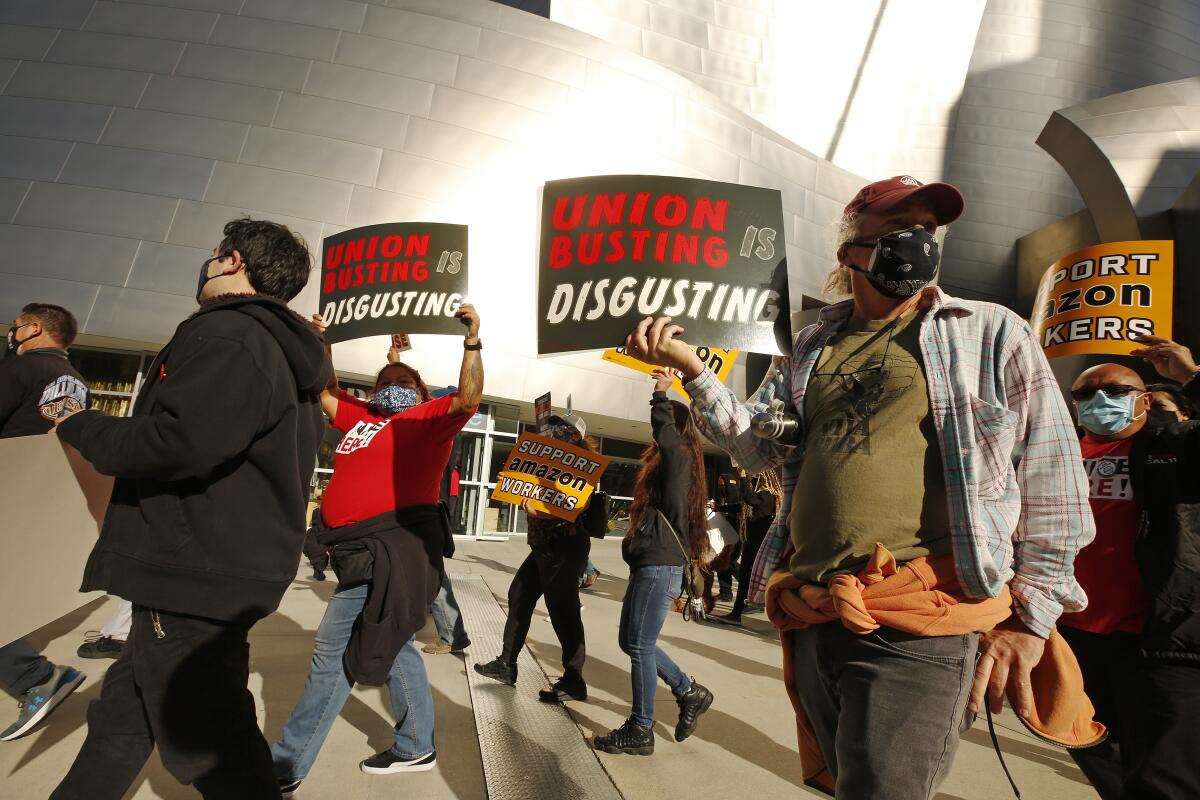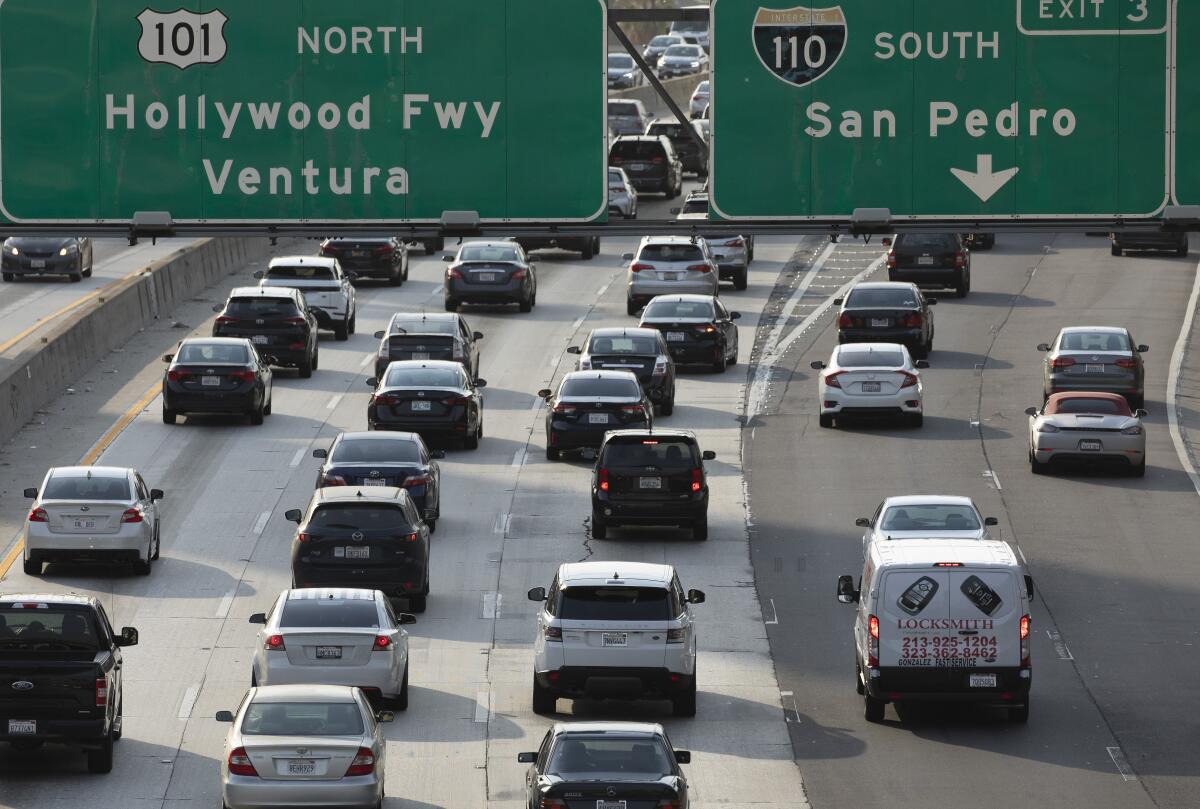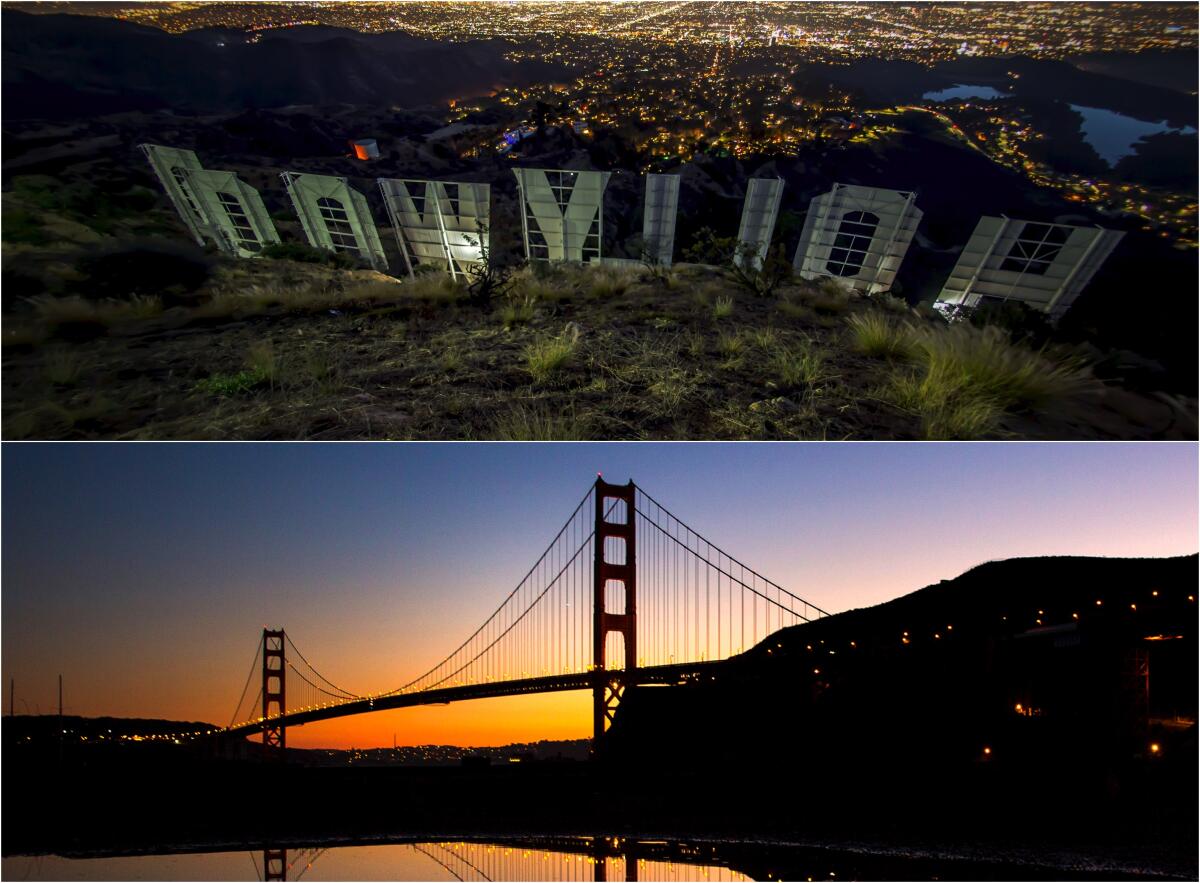The disagreement at the center of big turmoil in Hollywood

- Share via
Good morning, and welcome to the Essential California newsletter. It’s Monday, Oct. 11. I’m Justin Ray.
One of the worst parts of the pandemic has been isolation. Even the most introverted people (like me) craved company as bars, concerts and other social events became forbidden.
Consequently, streaming entertainment rose to prominence — not only because we were bored, but also because solitude made us appreciate the beauty of the collective viewing experience. Online conversations around shows like “Tiger King,” “The Undoing” and “Wandavision” were one of the only ways people could connect to one another.
Something you may not have considered is the scores of people behind these productions. Without them, much of your favorite entertainment could not be made. Around 60,000 costumers, makeup artists, camera operators and other entertainment workers who make up the International Alliance of Theatrical Stage Employees have overwhelmingly thrown their support behind a nationwide strike if no deal is reached with the studios. The last time crews staged a major strike was in 1945 in the walkout known as “Hollywood’s Bloody Friday.”
Talks will continue this week. I spoke with my colleague (and really good friend) Anousha Sakoui, who as been writing about the situation. She explains what IATSE workers are demanding, what could happen to Hollywood should they strike, and what precedent there is for this situation.
What is IATSE asking for and what hardships led them to make such demands?
Crews complain of long days: 12 to 14 hours are standard. They often work so-called Fraturdays, which now are commonplace; that’s a term that means weekend rest is cut short by working into the early hours of Saturday.
IATSE is asking for concessions that improve four key concerns: pay raises to ensure a living wage for their lowest earners; sustainable benefits; more rest periods; and for streaming productions to compensate members at the same rate as traditional productions. Under the current contract — even though streaming is now a dominant form of distribution for both features and series — streaming productions can claim discounts on wages and contributions to the IATSE health and pension plan. This harkens back to a decade ago when the union wanted to foster new employment and streaming was still nascent.
Why is this happening now?
Many of these issues have been bugbears for crews for decades, such as rest periods; crews driving home tired have led to fatalities. The cost of living in L.A. has meant that the near minimum wage many of these skilled workers earn as a union scale rate is hard to make ends meet on.
The pandemic has led many people to reevaluate their priorities. Crews are no different. Entertainment workers saw studios spend millions on whatever it took to get crews back to work. Now that crews want more pay and rest, the money can’t be found. Studios for their part have suffered losses as a result of the pandemic, and the Alliance of Motion Picture and TV Producers — the organization that represents studios and streamers in bargaining with unions — said they have listened to the union and made offers to improve the current contract.
If Hollywood workers decide to strike, what could happen to entertainment studios?
Most TV and film productions rely on skilled unionized workforces and without the 60,000 members of IATSE, production would likely grind to a halt. Now, some productions for pay TV platforms like HBO may be able to continue. Or we could see — as in previous strikes by the Writers Guild — studios try to fill their airtime with unscripted shows. Some reality productions don’t use union crews.
And now, here’s what’s happening across California:
Note: Some of the sites we link to may limit the number of stories you can access without subscribing.
New state law makes it illegal to remove a condom without consent. California became the first state to prohibit “stealthing,” or removing a condom without permission during sex, after Gov. Gavin Newsom signed a bill into law Thursday. Assemblywoman Cristina Garcia (D-Bell Gardens) originally tried to make it a crime in 2017 after a Yale University study that year said acts of stealthing were increasing against both women and gay men. Lawmakers in New York and Wisconsin previously proposed related legislation. Los Angeles Times
Heads up, California drivers: Your insurer may owe you even more in pandemic refunds. California’s insurance commissioner, Ricardo Lara, determined earlier this year that vehicle insurers had shortchanged policyholders to the tune of hundreds of millions of dollars when it came to refunding premiums because of the pandemic. He told the companies they needed to stop messing around and make their customers whole. Most Californians were no longer driving as much as they had prior to the coronavirus, Lara stressed, and accident claims were way down, which should bring down premiums. At least three leading insurers shrugged off his warning, according to the insurance commissioner’s office. Now those firms — Allstate, Mercury and CSAA — could face millions of dollars in fines. Los Angeles Times

L.A. STORIES
L.A. wants your leftover takeout utensils and sauce packets. Here’s where to donate them. Do you have a mountain of leftover takeout utensils and sauce packets gathering dust in a drawer somewhere? Well, you can put them to good use. L.A. Sanitation and Environment’s City Facilities Recycling Program is collecting them throughout October to use at a downtown food kitchen and pantry. Loose plastic utensils will not be accepted. Donations will go to the St. Francis Center, which provides services, hot meals and groceries to homeless and low-income people in downtown L.A. Los Angeles Times
Our daily news podcast
If you’re a fan of this newsletter, you’ll probably love our new daily podcast, “The Times,” hosted by columnist Gustavo Arellano, along with reporters from across our newsroom. Every weekday, it takes you beyond the headlines. Subscribe on Apple Podcasts and follow on Spotify.
POLITICS AND GOVERNMENT
Oakland awards $100,000 in grants to help close digital divide. The city of Oakland has launched several initiatives in recent years to address some residents’ difficulties with gaining internet access. The city announced that 10 local organizations will receive $10,000 each to help close the digital divide among residents. The recipients will receive the grants through the city’s partnership with Greenlining Institute, a local nonprofit focused on resolving systemic inequalities through policy work. Oaklandside
California becomes first state to require ethnic studies for high school graduation. After more than five years of intense scrutiny and effort, California on Friday became the first state to make ethnic studies a required class for high school graduation to help students understand the past and present struggles and contributions of Black, Asian, Latino and Native/Indigenous Americans and other groups that have experienced racism and marginalization in America. Although critics from across the political spectrum remain, the bill garnered overwhelming support in the Legislature and was signed into law by Gov. Gavin Newsom, who had vetoed a nearly identical measure last year. Los Angeles Times
Support our journalism
HEALTH AND THE ENVIRONMENT
Unvaccinated Californians were between 15 and 20 times more likely to die of COVID-19 than vaccinated ones when deaths from the disease most recently peaked at the start of September. That’s according to data from the California Department of Public Health, which publishes information on the vaccination status of people who test positive for coronavirus as well as people who are hospitalized with, and die from, COVID-19. San Francisco Chronicle
CALIFORNIA CULTURE
The pandemic left offices full of unused tech and students without digital access. Then reWerk stepped in. During the pandemic, California schools and nonprofits found themselves in desperate need of technical equipment. At the same time, hundreds of thousands of laptops, monitors and keyboards began collecting dust in tech offices across the state after Gov. Gavin Newsom ordered office workers in nonessential roles to stay home. A nonprofit called reWerk decided to take the tech and redistribute it to bridge the digital divide. So far, major companies such as Disney, Twitter and Yelp have donated equipment. Dot LA
Dodgers vs. Giants is more than a game. It’s California’s ultimate divide. The divide between those who root for the Los Angeles Dodgers and fans of the San Francisco Giants is bringing up a lot of tensions. “The teams aren’t just a collection of players on a baseball diamond but the stand-in for a contest between cities that can’t be measured in balls and strikes, or decided by runs batted in or men left stranded. Wealth and culture. Style and sophistication. Social influence and political clout,” writes columnist Mark Z. Barabak. Los Angeles Times

Free online games
Get our free daily crossword puzzle, sudoku, word search and arcade games in our new game center at latimes.com/games.
CALIFORNIA ALMANAC
Los Angeles: 73 San Diego: 69 San Francisco: Enjoy this photo of a baby llama. Cloudy 70 San Jose: Cloudy 70 Fresno: Cloudy 68 Sacramento: Cloudy 70
AND FINALLY
Notable birthdays:
Cardi B was born Oct. 11, 1992. Her performance of “WAP” at the 2021 Grammys sparked a lot of comments on social media.
Hugh Jackman was born Oct. 12, 1968. The actor recently starred in the movie “Reminiscence,” a dystopian detective story in which the private investigator gumshoes his way through memory to solve the mystery.
If you have a memory or story about the Golden State, share it with us. (Please keep your story to 100 words.)
Please let us know what we can do to make this newsletter more useful to you. Send comments to essentialcalifornia@latimes.com.
Sign up for Essential California
The most important California stories and recommendations in your inbox every morning.
You may occasionally receive promotional content from the Los Angeles Times.



